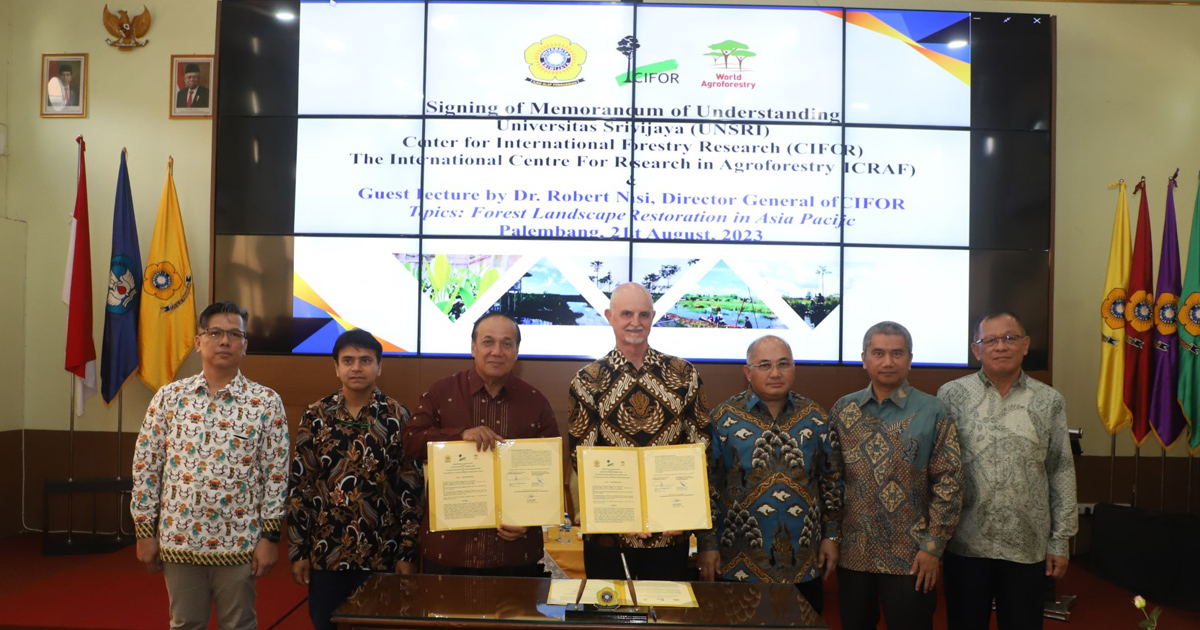
A renewed formal collaboration between the university and the Center for International Forestry Research and World Agroforestry (CIFOR-ICRAF) will stimulate research into ways to effectively and efficiently restore landscapes and address other critical issues.
Universitas Sriwijaya is based in Palembang, in Indonesia’s South Sumatra Province, which has hundreds of thousands of hectares of degraded peatland. The renewed research agreement contributes to the global community’s effort to intensify restoration of the world’s degraded land through mechanisms such as the Land Degradation Neutrality framework of the United Nations Convention to Combat Desertification and the Bonn Challenge. The agreement also contributes specifically to the Government of Indonesia’s efforts to restore an estimated 12 million hectares of degraded land by 2030, of which 2 million is degraded peatland. Research into site-specific techniques, especially in populated landscapes, is crucial for ensuring the success of such programmes; many restoration projects have failed by not fully understanding their landscape and the people in it.
Achieving this ambition in a mere seven years will require all stakeholders to work together in a coordinated manner, with appropriate funding, monitoring and adjustments. The two organizations are keen to assist the government achieve its goals through applied research into new restoration methods – particularly those suited to degraded peatland – and ways of increasing the scale of successful methods efficiently and effectively.
The collaboration document, in the form of a memorandum of understanding (MoU), was signed by the Rector of Universitas Sriwijaya Anis Saggaff and CIFOR-ICRAF’s Chief Operating Officer Robert Nasi at the university’s campus in Palembang on 21 August 2023.
“We have been collaborating under the first 5-year MoU as part of the project, Sustainable Community-based Reforestation and Enterprises or SCORE,” said Nasi during the signing ceremony. “The research has already been successful after just two years of implementation: we have developed a new ‘agrosilvofishery’ approach that can be increased in scale across related peatlands.”

Led by Himlal Baral, a senior restoration scientist with CIFOR-ICRAF, the research team, which includes researchers from UNSRI and the National Institute of Forest Science of the Republic of Korea, have created a 13-hectare demonstration site in collaboration with farmers that showcases the agrosilvofishery approach, which combines rice, trees and fishponds on a single plot.
CIFOR-ICRAF has also engaged with universities, including UNSRI, to conduct two series of a Young Scientist Incubator Programme, which involved more than 100 fresh graduates in training, field data collection and writing of site-specific cases of peat ecosystem livelihoods in the province.
“We can further strengthen the relationship between CIFOR-ICRAF and UNSRI in conducting studies and research, especially related to peatland and mangrove restoration,” said Saggaff. “The peatland restoration pilot project is in Perigi Village, Ogan Komering Ilir District. We also have another collaboration activity in mangrove restoration in Sungsang Village, Banyuasin District. I believe that this cooperation can be further expanded into other aspects of forestry to gain new knowledge in order to improve the recovery of degraded natural resources and also improve the welfare of surrounding communities.”
The mangrove project is just beginning. It aims to contribute to understanding how best to restore mangroves in Indonesia, where around 1.82 million of the 3.31 million hectares covered with mangrove forests are currently degraded – another large figure that creates an equally large challenge for restoration programmes. The collaboration expects to provide models for restoration that address the drivers of deforestation by creating economic and environmentally friendly solutions.
Other projects by CIFOR-ICRAF in South Sumatra Province include: Improving the Management of Peatlands and the Capacities of Stakeholders in Indonesia (Peat-IMPACTS Indonesia), funded by the International Climate Initiative (IKI) of the German Federal Ministry for the Environment, Nature Conservation, Nuclear Safety and Consumer Protection (BMUV); and Sustainable Landscapes for Climate-Resilient Livelihoods (Land4Life), funded by Global Affairs Canada. Both projects are aligned with the national target of restoring and rehabilitating peat ecosystems in Indonesia, and cover 18 villages in Ogan Komering Ilir, Banyuasin and Musi Banyuasin districts. The Government of South Sumatra is also receiving assistance to develop a Peat Ecosystem Protection and Management Plan. In addition to providing education on sustainable peatland management to youth, CIFOR-ICRAF has been working with the provincial and district governments to produce local curricula on sustainable peat ecosystems that are now part of formal processes in elementary schools in Ogan Komering Ilir and Banyuasin districts.
For more information, contact Himlal Baral: h.baral@cifor-icraf.org.


















